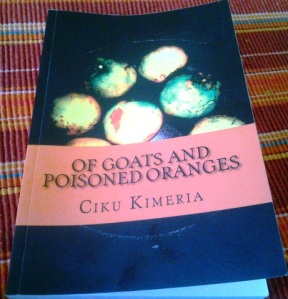Of goats and poisoned oranges, a novel by Ciku Kimeria, explores the family life of a middle-class Kenyan couple – Wambui and Njogu. Years into the marriage, Njogu gets a mistress, Nyambura. He has a child with each of the women (although later it is revealed he is actually impotent – which means he didn’t father the boys). All that mess, plus the inerasable differences in social background, the power play regarding the family wealth, the hypocrisy and even greed, weave up to form an intriguing read as told by different characters in the book.
The novel starts with Wambui attending her own funeral. I immediately found myself asking questions – interesting questions. Is Wambui actually dead, if so then how is it that she is attending her own funeral? Or is it her ghost attending the Is Wambui having a dream about her funeral?
Even later when I learn that Wambui is indeed alive, more questions emerge. I asked why she is faking her death; why she would attend her funeral and risk being spotted, albeit her new identity.
Answers to these questions get answered one at a time as I turn page after page of the novel, but I can’t promise you everything in the book is explained or answered. I for instance, kept asking myself if Wambui underwent plastic surgery as part of acquiring her new identity. Did she change her hairstyle or start wearing spectacles. But again, that is the beauty of the novel, if gives what it can and allows the reader to explore and imagine.
However, what’s for me most intriguing about the novel is how Kimeria tells the story from the perspective of several characters. Kimeria breaks the common rule of telling a story through the eyes of one or two characters. In goats, every single character plays a part in building a chapter. We get to understand what Wambui thinks about her husband Njogu and vice versa, what Nyambura fantasizes about her affair with Njogu and so on.
At the end of the day, a mesh of a messy family relationship is revealed by mother, father, son, step-son, maid, mistress, sister, brother, etc. – with each fronting their own truth, what they believe is their truth.
The hypocrisy, lies and greed that characterize most marriages or families for that matter, is not something new per se, but Kimeria gives a sparkle to these themes by telling the story differently and giving liberty to the characters to strip before the reader using their words.
Then there is the simplicity of language, the localization of events and concreteness of situations that shows the writer had control over her knowledge. The description of life in jail as experienced by Nyambura, the pettiness of Wambui’s attitude towards the ‘unwashed’ friends of her husband Njogu, are some but a few incidences where the writer takes you home with the simplicity of language without diluting the story she is telling.
What took me back about the novel though, were the footnotes. Most of the vernacular words used were easily understandable in the context for which they were used and one could easily derive meaning. For instance, on Page 6, Kimeria writes:
“Oh, my gachungwa, I had missed you so much.”
Then a footnote is given to explain what gachungwa is: “Kikuyu word of endearment. Literally translates to “sweet orange”.
And then there is this;
“No, this githeri is not burnt at all, it’s quite delicious.”
The footnote goes on to explain: Githeri – A traditional Kikuyu meal primarily made of maize and beans.
Even the more known ‘vernaculars’ such as nyama choma, Mau Mau and Matatu are explained in the footnotes which just took it away for me, I felt spoon-fed and thought the writer was being apologetic for no reason.
And in the last chapter of the book, I got a feeling that the switch from the use of First Person to Third Person (as told by narrator), was a difficult one. As a reader, I had become comfortable eating the story as served by the different characters, then at the end of it, when Njogu decides to kill Wambui, a narrator takes the dish away.
I imagine the shift in Point of View was made to allow for a detachment from both Njogu and Wambui who, at that point, couldn’t tell their own stories. We needed to see how Njogu “grabbed Wambui by the neck” and how Wambui struggled to breathe as she was strangled.
Still, the ending came out neatly. I totally didn’t foresee Njogu killing Wambui and the ease with which he executed the act made me even wonder if I knew him at all.
This book is a must read.
Ciku Kimeria, the author of Of Goats and Poisoned Oranges, is a Kenyan writer and consultant. Courtesy Photo

